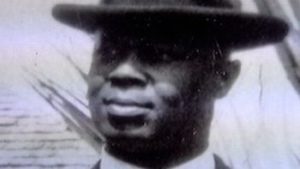
James Farmer Sr.
*James L. Farmer Sr. was born on this date in 1886. He was a Black educator, administrator, minister, and historian.
James Leonard Farmer’s parents, former slaves Carolina and Lorena (Wilson) Farmer, were from Kingstree, South Carolina. His grade school was in Pearson, GA. There was no high school for Blacks. However, Farmer acquired a working scholarship from Mary McLeod Bethune to the Cookman Institute in Daytona Beach, Fla.
A straight-A student, Farmer was accepted into Boston University in 1909. He received four $100 scholarships from the university. The farmer walked to Boston; there was no money for transportation, and nothing to hitch a ride with except an occasional horse and wagon. He slept en route in the barns of kind farmers. Farmer earned his Bachelor's in 1913, his Bachelor's of Sacred Theology in 1916, and his Ph.D. in 1918.
He worked full-time as a valet and carriage boy for a wealthy white woman, sending money home to support his parents. Because Boston University required two years of residency to earn a Ph.D., Farmer, who had completed the coursework and written his dissertation in a year, entered Harvard University in 1917 to do graduate study. The Foundation article said Farmer entered the Texas Conference of the Methodist Episcopal Church in 1917.
He was also an ordained deacon, the first step toward being a Methodist minister. During this time, he married Pearl Marion Houston, whom he had met at Cookman Institute the same year. In 1918, he was a candidate for a year's study abroad at the University of Basel (Switzerland), but the United States' entrance into World War I made that impossible. A year later, he became an elder in the Texas Conference of the Methodist Episcopal Church, the state in which he spent the rest of his life.
Following Farmer's graduation, he joined the Texas Conference and was assigned by Methodist bishops to churches in Texarkana, Texas, where his first child, Helen Louise, was born. He went to Galveston, then to Ebenezer in Marshall, where in 1919, he was assigned to Wiley College. One year later, his son James Farmer Jr. was born. At Wiley in 1920, Dr. Farmer taught economics, philosophy, religion, Greek, and Hebrew. He also preached regularly at the school.
In 1925, Farmer wrote Progress of a Race, and the theological seminary in Atlanta conferred an honorary Doctor of Divinity on him in 1929; Farmer subsequently taught there from 1930 to 1933. He left Wiley College to become the dean at Rust College in Holly Springs, Miss., at the end of the school year in 1920. He remained there until 1925 when he was hired away to Samuel Huston College. When he took over the (Samuel Huston) registrar's office in 1928, he found it in bad condition and endangered the college's standing with the state. But, due to his self-sacrificing industry, the state inspector declared that the condition of the registrar's office had improved. They placed Samuel Huston College in the state's front rank of educational institutions.
As a writer, Farmer was prolific, having contributed numerous articles on sociological subjects to newspapers and magazines and written the Sunday School Lessons for the Southwestern Christian Advocate from 1919 to 1929. He usually wrote his name, "J. Leonard Farmer," on all his publications. Sometime before 1932, he became the dean and principal teacher of the Gulfside School of Ministerial Training near Gulfport, Miss. They trained Black ministers seeking continuing education or who could not attend a seminary full-time. Farmer returned every summer until he retired in 1956. Farmer returned to Wiley College in 1933. He again served as a professor of religion, philosophy, and psychology and continued his Sunday afternoon preaching at the Wiley College Chapel.
In 1939, Farmer entered Howard University in Washington, D.C. and became the second Ph.D. on the faculty of the School of Religion. The other was Dean of the School of Religion Benjamin E. Mays (Ph.D., 1935, University of Chicago). During this time, a wealth of his writing and lectures occurred. In 1943, he wrote The Coming of Peace and the Prince of Peace. He wrote regularly for the A.M.E. Zion Quarterly Review and lectured at Fisk University at the 17th Annual Session of the Interdenominational Institute in 1944. Farmer returned to Austin, Texas, to Huston-Tillotson College in 1946 as registrar, professor of philosophy, and chairman of the social science division. In 1956, he retired from teaching, returned to Washington, D.C., and reviewed books on theology for the Journal of Religious Thought.
His son, civil rights leader James Farmer, Jr., founder of the Congress of Racial Equality (CORE), wrote extensively of his father in his Lay Bare the Heart: An Autobiography of the Civil Rights Movement. CORE was headed for New Orleans on two buses as a beacon of the Civil Rights movement. The Freedom Rides had begun, and Farmer was on one of the buses. His father lay in a bed in Freedman's Hospital in Washington, D.C., dying from the complications of cancer and diabetes. The younger Farmer had left a copy of his itinerary with his father. On the night of May 14, 1961, the day before the Freedom Rides, with Farmer on the Trailways bus, was to enter Alabama, he got a call that his father had died and left the ride to return to Washington.